One of the many adverse impacts of the 2021 military coup has been the return of Big Brother to Myanmar. The state security apparatus is once again persecuting all opponents of the junta and bullying the general public in order to entrench military rule and reassert the generals’ status as “superiors” lording it over the whole society.
Since the coup, the regime’s spy network, generally known as “Military Intelligence”, or MI, has been arresting and brutally torturing—often to death—anyone suspected of being directly involved in, supporting or having connections with any anti-regime movement, in an effort to extract information on its perceived enemies.
The Southeast Asian nation has been in revolt since the takeover as the vast majority of the people reject the coup. Many young people have taken up arms to fight against the junta.
Officially known as the Office of the Chief of Military Security Affairs (OCMSA), the agency is behind the “overnight detentions” in which alleged dissidents are arrested in night raids, and their bodies returned the following day. Dissidents are subject to various forms of torture, sometimes fatal, at hellish interrogation camps where MI members use rape as a weapon against not only female activists but also males.
The office is the successor to the MI, which was dissolved in 2004 following the purge of powerful spy chief General Khin Nyunt.
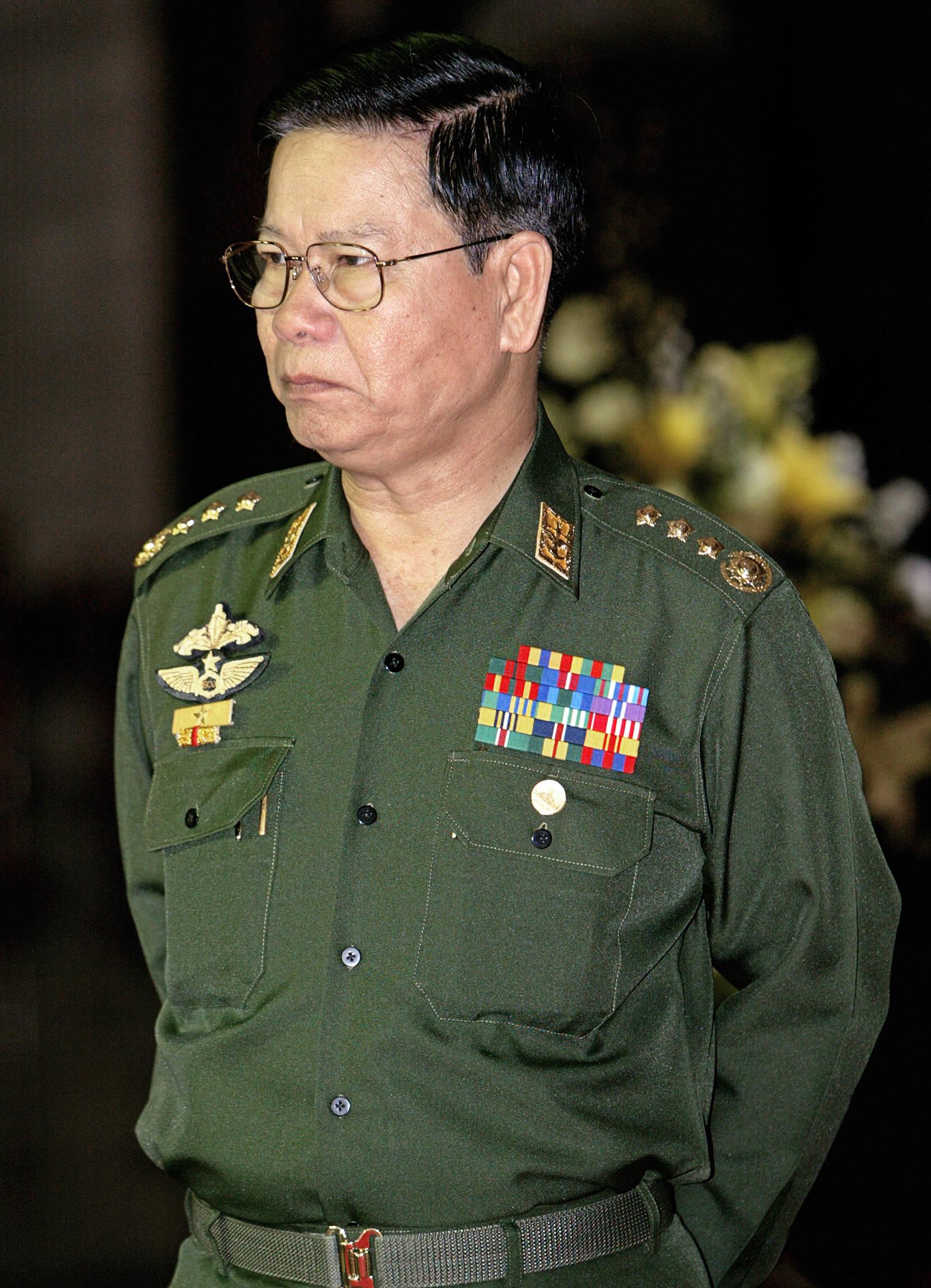
Its purpose is much the same: to keep the activities of democracy activists and anyone deemed to undermine the interests of the Myanmar military under surveillance, Big Brother-style. Since the coup, its primary responsibility has been clear: to jail or kill anyone involved in the popular revolt against the regime.
It is not wrong to say that this has been the MI’s primary duty under successive governments.
Bloody legacy
After the military takeover in 1988, the military spy agency led by Gen. Khin Nyunt, the Secretary-1 of the then junta, was notorious for its inhumane treatment of democracy activists.
As many as a thousand—those who were “fortunate” enough to survive the systematic torture at the junta’s interrogation camps—were believed to have been put behind bars between 1988 and 2004. A fate worse than death was waiting for them.
MI officers set up Kangaroo courts in prisons and told the judges what prison sentences—mostly lengthy—should be handed down to whom. After the verdicts, most of the political prisoners were transferred to jails in remote corners of the country in a move deliberately designed to cause distress to their relatives and make it financially burdensome for them to visit the inmates.
At least 200 political prisoners given lengthy sentences died in prison due to poor conditions, abuses and lack of access to proper medical treatment, according to data from the Assistance Association for Political Prisoners.
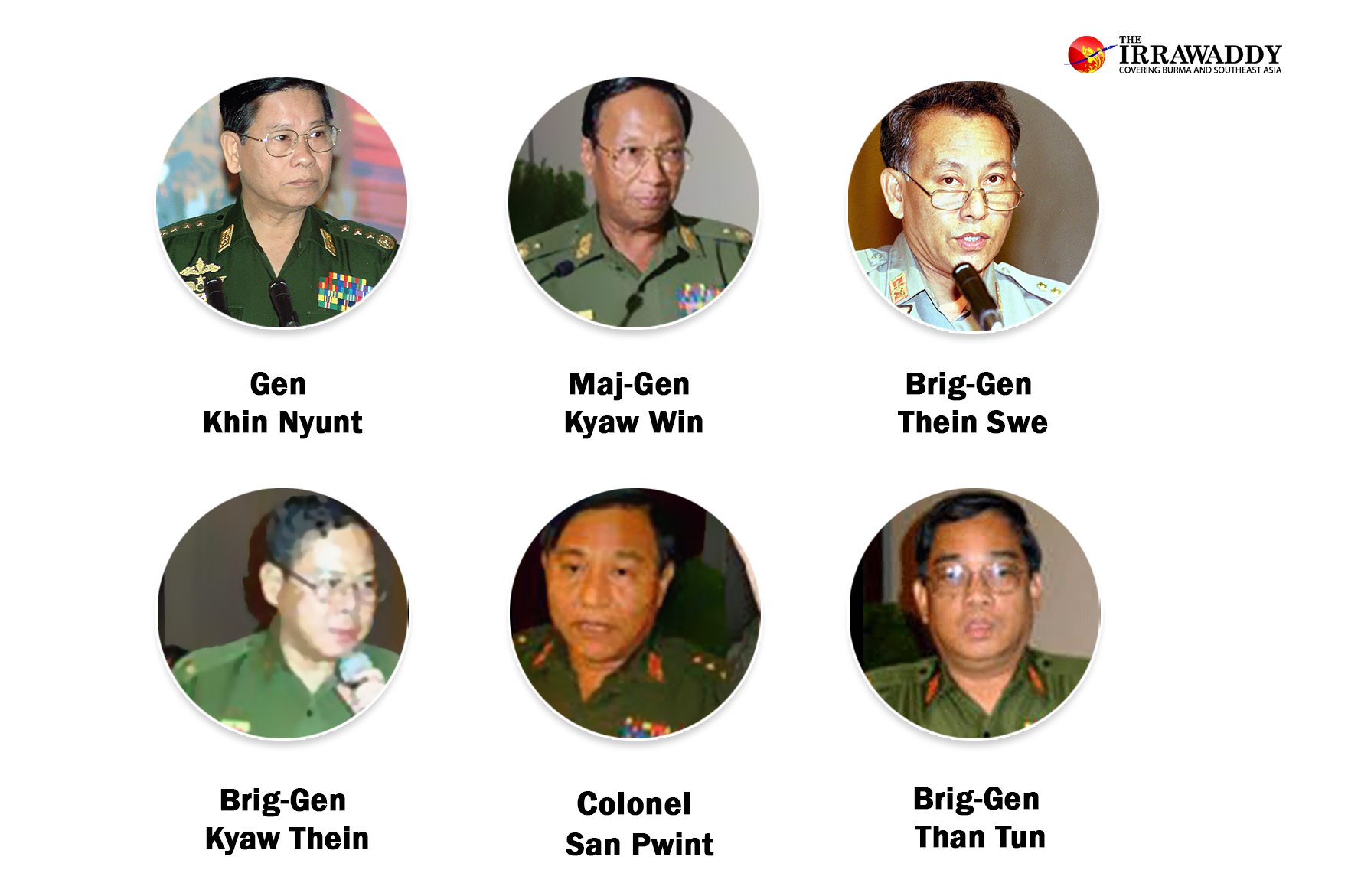
After Gen. Khin Nyunt, Brigadier General Kyaw Win, Brigadier General Than Tun, Brigadier General Kyaw Thein, Brigadier General Thein Swe, Colonel San Pwint and Colonel Hla Min were the key MI officers responsible for bolstering the military dictatorship, persecuting democracy activists and building a sham peace by offering business incentives to ethnic armed organizations (EAOs).
The spy chief, who was also the Secretary 1 of the then regime, which called itself the State Law and Order Restoration Council, did not just seek to destroy the EAOs, but also, in the name of internal peace, used business incentives and other gambits—for example, the use of religion in the case of the Democratic Karen Buddhist Army’s split from the Karen National Union.
As part of the then regime’s propaganda campaign in which it sought to counter media with media, the Myanmar Times, a media outlet in which the head of the MI’s international relations department, Brig-Gen Thein Swe, and his son Sonny Swe had a stake, published an English-language journal serving as the mouthpiece of military leaders, and as their propaganda machine. While all other media outlets faced draconian censorship, the Myanmar Times was the only media outlet privileged by the regime.
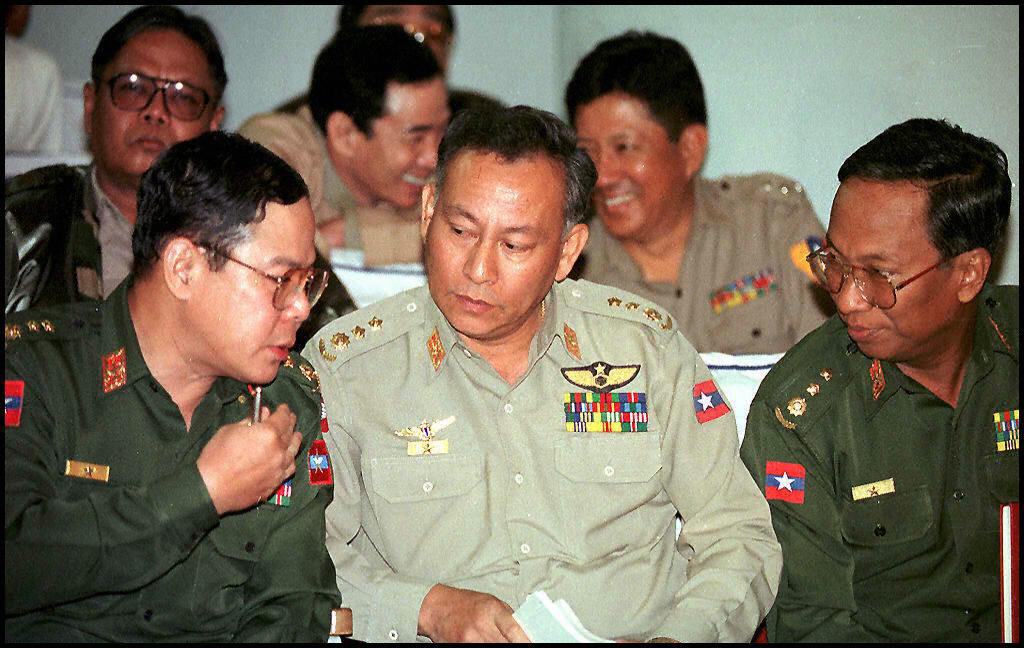
Khin Nyunt, who was visited by Min Aung Hlaing late last year following the coup, has not admitted to the crimes that he masterminded and committed throughout the rule of previous military regimes. He has not faced legal consequences, either. And he has put the blame on then military dictator Than Shwe, saying the junta leader’s subordinates had to listen to what their boss said.
New blood
Six generals have taken the helm of the MI since it was reconstituted in 2004, following the purge of Khin Nyunt. Both Than Shwe and his successor Min Aung Hlaing have appointed trusted generals to the post.
The first was Lieutenant-General Myint Swe, who has been serving as the acting president since the Myanmar military seized power in a coup last year. Myint Swe, who was then the chief of Yangon Command, played the lead role in the arrest of Khin Nyunt. He concurrently served as the chief of Yangon Command and the spy agency.
He was succeeded by Lieutenant General Ye Myint in 2005. Ye Myint became the Mandalay Region chief minister under U Thein Sein’s quasi-civilian government.
In its early days, the Chief of Military Security Affairs’ performance in intelligence gathering was graded as poor, partly because it was understaffed and needed time to build a new network of informants as a completely new agency, and also because of certain restrictions imposed out of fear that the agency’s leadership might follow in the footsteps of Khin Nyunt.
The agency’s personnel, who had previously gathered information about high-ranking military officers and conducted counterintelligence operations, were reportedly reduced to asking for information from local police—who were just the MI’s lackeys during its heyday—so that they could make regular reports to their higher-ups.
The only thing the reconstituted spy agency could do as well as its predecessor was extorting protection money from KTVs and massage parlors, and illegal lottery sellers, wrote Moe Zay Nyein in his investigative article “What is OCMSA?” On social media, the writer revealed inside information obtained from Myanmar military and police personnel.
During the Saffron Revolution in 2007, MI personnel took an active part in monitoring and documenting protests, and in arrests and interrogations.
Lt-Gen Ye Myint contested the 2010 general election on the ticket of the military’s proxy Union Solidarity and Development Party, and became the chief minister of Mandalay Region. Lt-Gen Kyaw Swe, who was a classmate of current deputy junta chief Soe Win at the Defense Services Academy, took charge of the security affairs office. He was appointed by armed forces chief and current junta leader Min Aung Hlaing as defense minister—a military-controlled portfolio even during civilian rule—under the National League for Democracy (NLD) government.
Born of a bad seed, the agency started to follow in the footsteps of its predecessor over time, killing detainees during interrogation.
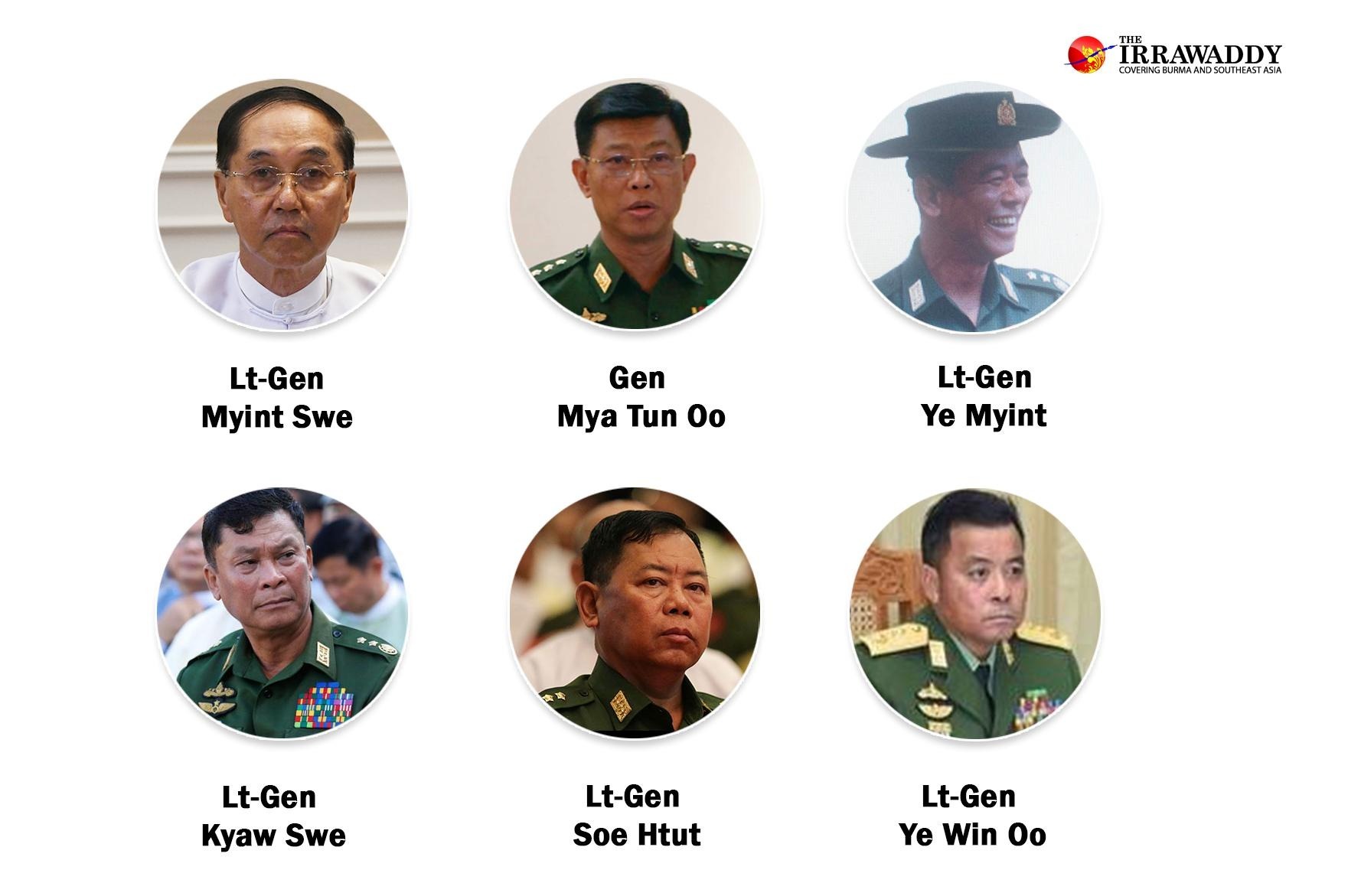
In 2012, the security affairs office under the Northern Command of the Myanmar military detained Brang Yawng from Kachin State’s Waingmaw and another man on suspicion of having ties to the Kachin Independence Organization. They were beaten and forced to sodomize each other. Brang Yawng’s wife sent an appeal to then President U Thein Sein to drop the case as soon as possible.
Despite apparent democratization under ex-general President U Thein Sein’s administration, the agency kept on tailing democracy activists, NLD party members and lawmakers.
Lower House lawmaker Daw Khin San Hlaing of the NLD told The Irrawaddy that she was continuously tailed by security affairs officers during 2012 by-election and her speeches were recorded by them.
Lieutenant General Mya Tun Oo, who is now on the regime’s State Administration Council and also the defense minister, took the helm of the spy agency in 2014. He graduated from the 25th intake of the Defense Services Academy, and was an officer in the agency since the time of Maj-Gen Ye Myint.
After Mya Tun Oo was promoted to become a general and chief of general staff (army, navy and air) in 2016, military Advocate General Lieutenant General Soe Htut succeeded him. Lt-Gen Soe Htut is currently the regime’s home affairs minister—a position he also held under the NLD government.
Soe Htut was part of the 64th intake of the Officer Training School, and was a son of Brigadier-General Lun Maung, who died along with Lt-Gen Tin Oo, one of the top brass in Than Shwe’s regime, in a helicopter crash in 2001.
In Soe Htut’s era, the spy agency continued to shadow, take pictures, and record the speeches of NLD lawmakers, prompting them to formally complain in the Lower House in 2017 and 2019. Then deputy defense minister Myint Nwe responded to the Parliament that those activities were carried out in public and therefore did not violate any law.
Soe Htut was succeeded by commander of South-Western Command, then Major General Ye Win Oo, in 2020.
The Man in Charge of Min Aung Hlaing’s Torture Chambers
The current spy agency chief, Lieutenant General Ye Win Oo, is 56 and a confidant of Min Aung Hlaing and his family. He is also the joint secretary of the SAC. Ye Win Oo’s deputy in the spy agency is Major General Toe Yi.
A cohort of the 77th intake at Officer Training School, Ye Win Oo has been close to Min Aung Hlaing and his family since being appointed a General Staff Officer (G 1) at Yangon Command some 10 years ago.
This is reminiscent of the former military dictator’s appointment of his aide Yangon Command chief Myint Swe (now the acting president of the current regime) as the spy agency head in 2004.
Ye Win Oo led raids on the Presidential Residence and Daw Aung San Suu Kyi’s residence in Naypyitaw during the military’s Feb. 1, 2021 coup. He oversees the arrests and brutal interrogations of dissidents, which often result in deaths.
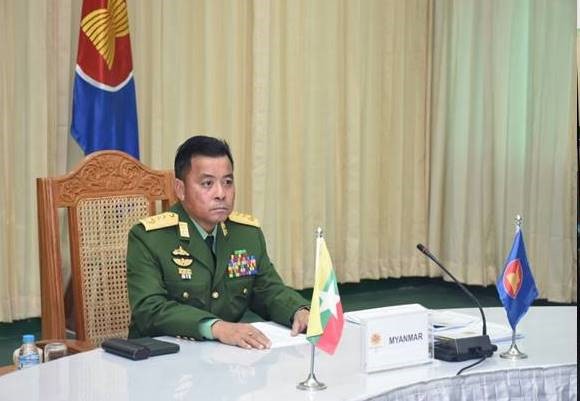
He accompanied Min Aung Hlaing when the junta chief visited Khin Nyunt at his house in Yangon in December last year.
Since the coup, the regime has expanded its spying department into an Upper Myanmar Office and a Lower Myanmar Office. The Lower Myanmar unit is headed by Major General Aung Kyaw Kyaw, who was promoted from the rank of brigadier general and was formerly an assistant adjutant general at Naypyitaw military headquarters. The Upper Myanmar unit will be headed by Major General Kyaw Kyaw Lwin, who was also promoted from the rank of brigadier general and was previously serving in the Military Security Affairs office.
Min Aung Hlaing has recalled former military intelligence officers to give him advice as his regime desperately needs intelligence to suppress the nationwide resistance movement. At Min Aung Hlaing’s invitation, former high-ranking intelligence officers Khin Maung Thein, Ngwe Tun and Thein Swe have traveled to Naypyitaw to assist the regime.
Khin Maung Thein is a former ambassador to Japan. Ngwe Tun, a former lieutenant colonel, attended the Defense Services Academy with the coup leader, served in the Navy and subsequently joined the intelligence unit after receiving training in the US in 1987. He is now reportedly a full-time consultant for the military regime.
Thein Swe, an ex-brigadier general, attended the Defense Services Academy with former President U Thein Sein and served in the Directorate of Defense Services Intelligence. Later, he served as military attaché in Bangkok and was a close aide to Khin Nyunt. In his heyday, he ran the Myanmar Times newspaper with his son Sonny Swe, who went on to launch Frontier Myanmar magazine and currently serves as its CEO.
As the regime recalled former intelligence officers to duty, Ye Win Oo has displayed his loyalty to Min Aung Hlaing by overseeing torture chambers and squeezing information out of anti-coup activists.
As of last month, the Assistance Association for Political Prisoners-Burma (AAPP) had recorded a total of 707 deaths in junta custody. That number includes those killed at interrogation centers, in jails across the country and others killed in custody awaiting transfer. Victims include members of People’s Defense Force groups (PDFs), Myanmar’s ousted National League for Democracy (NLD) and civilians detained during raids on villages by junta troops.
“He has no distinguished military record. He was given a position close to [Min Aung Hlaing] because he is his confidant,” said a military analyst based in Myanmar, speaking on condition of anonymity due to security concerns.
In meetings with international diplomats in Myanmar or on his visits to Russia, Min Aung Hlaing is more likely to have Ye Win Oo beside him than Foreign Affairs Minister U Wunna Maung Lwin.
Successive military dictators have appointed their trusted confidants to lead their spy agencies, all of which have helped to entrench military rule by applying brutal methods to oppress the entire population.
All former and current military intelligence agencies must be held accountable for their torture, human rights violations and arbitrary persecution of dissidents, pro-democracy forces and members of the general public under consecutive military regimes over the decades.
Myanmar does not need such a brutal and notorious institution. It must be abolished, together with the military dictatorship.

















